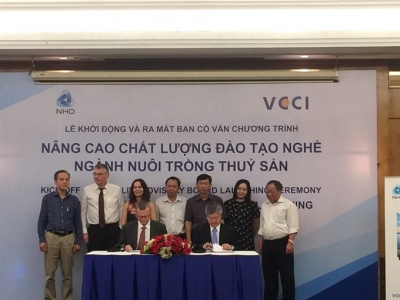VN boosts aquaculture training

Võ Tân Thành (R), director of the Việt Nam Chamber of Commerce and Industry’s HCM City branch, and Tore Myhre, director of the International Department at the Confederation of Norwegian Enterprise, sign an agreement for co-operation in improving the quality of vocational training for aquaculture. — VNS Photo
HCM CITY — The Việt Nam Chamber of Commerce and Industry’s HCM City branch and the Confederation of Norwegian Enterprise (NHO) yesterday began a two-year programme for improving the quality of vocational training in aquaculture.
Bùi Thị Ninh, head of the bureau for employers’ activities at the VCCI HCM, said the programme aims to link enterprises and vocational training schools, and reinforce enterprises’ collaboration with training schools to create a skilled workforce that is able to meet the requirements of employers in the aquaculture industry.
It also seeks to expand awareness of career opportunities in the field among parents and high school students, she said.
It will be piloted in Đồng Tháp and Khánh Hòa provinces.
Speaking at the launch in HCM City yesterday, Võ Tân Thành, director of the VCCI HCM, said fisheries is one of the country’s key economic sectors, with aquaculture and fishing output exceeding 6.7 million tonnes last year and export earnings reaching US$7 billion.
The industry employs around nine million people directly and indirectly, but more than 60 per cent are unskilled, he said.
Tore Myhre, director of NHO’s International Department, said investing in skills development, especially vocational training, is important to improve the productivity and profitability of enterprises.
Aquaculture is a sector that is growing in importance for both countries, he said.
NHO and VCCI, together with Vietnamese and Norwegian industry players, have identified a need for more skilled and productive operators in their value chain from production to processing, he said.
“The current availability of vocational training for the aquaculture industry is limited despite an increase in demand for human resources.
“The aquaculture industry is also becoming more technically advanced, which increases the demand for skilled workers.
“Working in aquaculture is by many perceived as a low-status job often associated with heavy manual labour. The industry is however in rapid development, and needs to attract motivated and skilled young professionals.
“For this to happen, one needs to increase knowledge among parents and young students about what it means to work on a modern fish farm.”
The project would address this through various career guidance initiatives, he said.
Thành said since 2010 the VCCI HCM, with technical support from NHO, has co-operated with the Đồng Nai College of High Technologyand companies in Đồng Nai Province to pilot a training programme in mechanical engineering and hospitality.
Ninety seven per cent of students from this training programme have got jobs after graduating, with their training quality deeply appreciated by employers, he said.
Following its success, NHO and the VCCI HCM have expanded their co-operation to the aquaculture sector, he added.
Có thể bạn quan tâm
 President Trump calls for balanced US seafood trade
President Trump calls for balanced US seafood trade US President Donald Trump has declared June 2017 to be National Ocean Month during a speech in which he promised to bolster global exports
 Vietnam becomes largest shrimp provider in RoK
Vietnam becomes largest shrimp provider in RoK A year after the Vietnam-Republic of Korea (RoK) free trade agreement became operational, Vietnam is the largest shrimp supplier of the RoK
 Fishmeal supplies look promising short-term, but long-term solution must be found
Fishmeal supplies look promising short-term, but long-term solution must be found A new report from Rabobank shows that international fishmeal supplies are stabilizing, calling into question the current growth strategies for the alternative